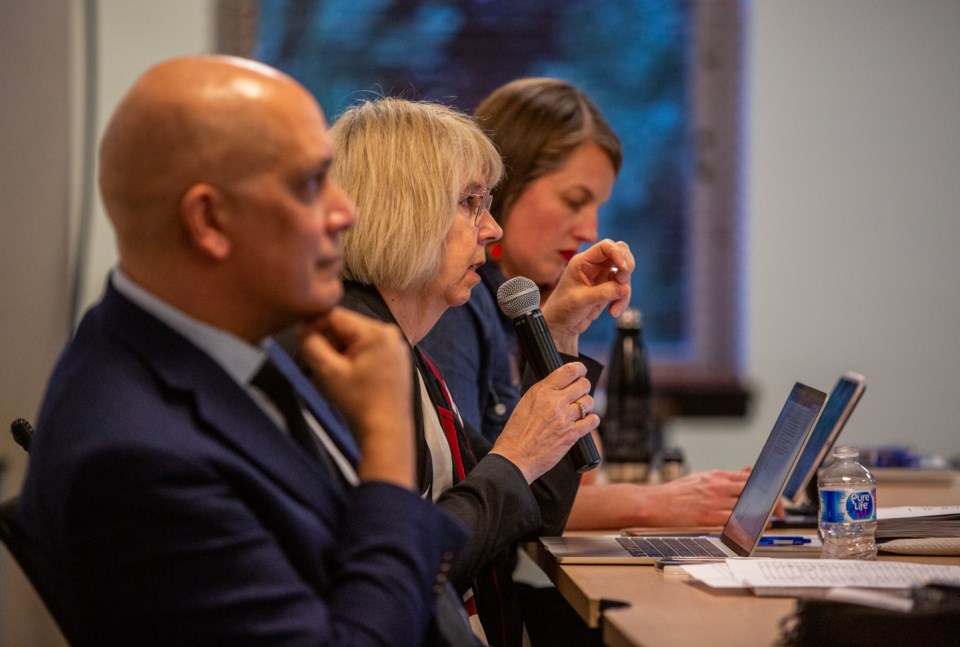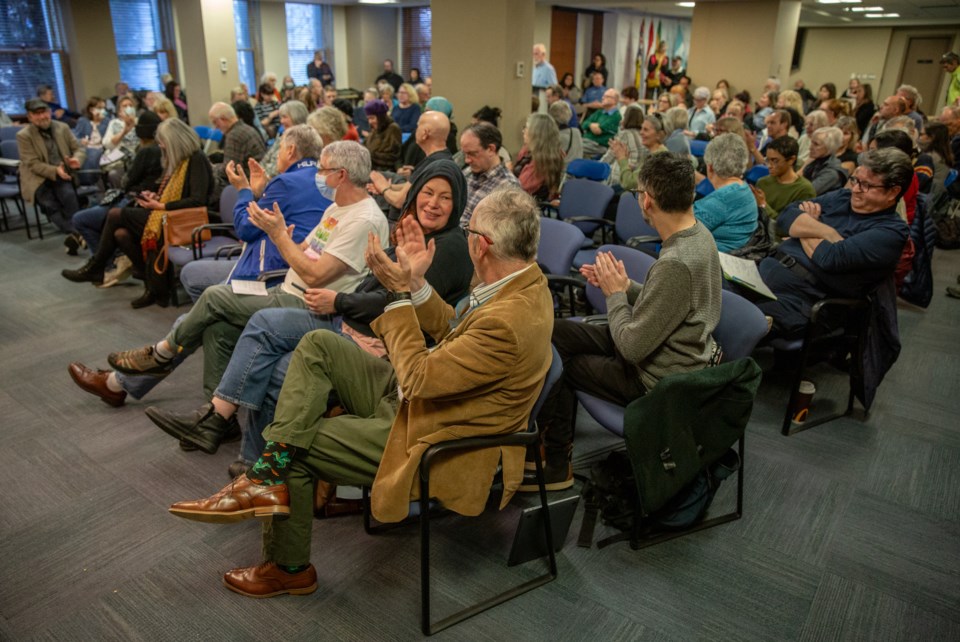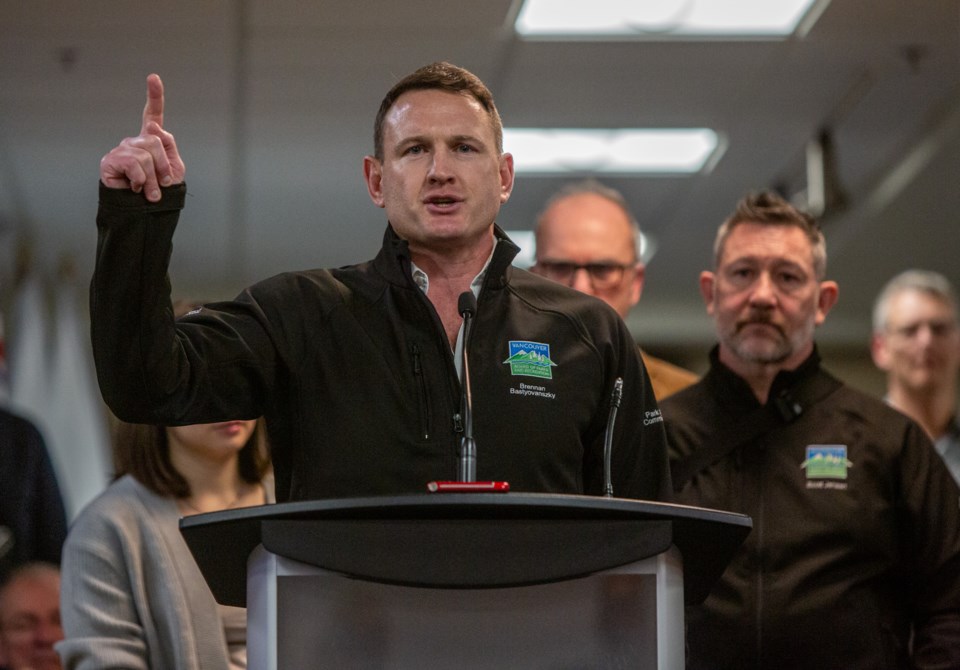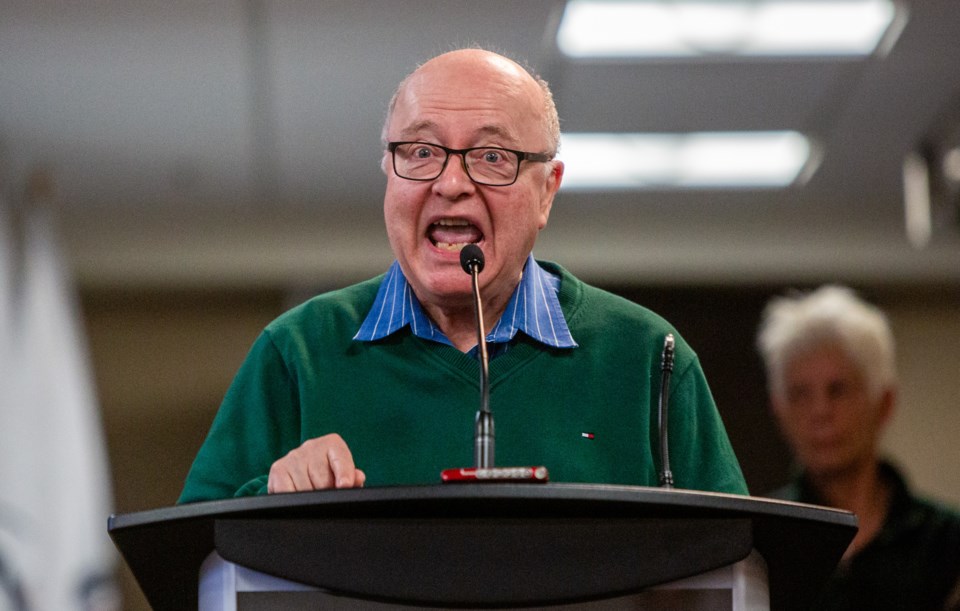More than 100 people showed up at a town hall meeting Thursday at Â鶹´«Ã½Ó³»city hall where all but one of the speakers slammed the mayor’s plan to abolish the elected park board.
But Ken Sim was not there to hear the criticism, nor were any councillors from his ABC Â鶹´«Ã½Ó³»party, which holds the majority on council and are working to bring parks and recreation under control of council.
The eight politicians’ absence was not surprising considering the forum was organized by the three councillors who oppose Sim’s move to abolish the board. Green Party councillors Adriane Carr and Pete Fry, along with OneCity’s Christine Boyle, have been vocal about the need to keep the board, which they reiterated Thursday.
“I think we all recognize that there's pieces to park board that require maybe further refinement and there's duplication of services and stuff,” Fry told the crowd at the beginning of the meeting.
“But that is sort of secondary to the issue. What is really at issue here is the elimination of an elected board and the disenfranchisement of tens of thousands of Vancouverites who went out and voted for park board commissioners and a vision that they put forward.”
Sim announced Dec. 6, 2023 that he wanted to eliminate the board, emphasizing it wasn’t a criticism of the commissioners — six of whom at the time were members of his own party — but a necessary move to fix “a broken system.”
The mayor has pointed to a leaky Kitsilano pool, the facade of the Aquatic Centre falling off, a jurisdictional dispute over a water pipe at Spanish Banks and the need for him to seek money from donors to get the Stanley Park train operating for the holidays.
Critics have pointed out that assets managed by the board are owned by the city.
Sim has also claimed the shift in governance will save “millions of dollars,” although he has yet to provide reporters a breakdown of where the savings would come from and whether there would be job loss.
City manager Paul Mochrie recently outlined steps city staff is taking to accommodate ABC Vancouver’s wish, which was approved in a formal motion at a council meeting in December. Mochrie’s update can be read here.
Many of the speakers at Thursday’s meeting said their passion for keeping the elected board should no longer be directed at Sim but at Premier David Eby and the provincial government.
For the mayor’s move to be successful, it requires an amendment under the Â鶹´«Ã½Ó³»Charter, which only the government can approve.

'It's got to be a landslide'
Nigel Peck of Nature Â鶹´«Ã½Ó³»said from a lectern in the Joe Wai meeting room on the main floor of city hall that an email-writing campaign was critical to stopping the abolition of the board.
Peck urged each member of the crowd to convince at least two friends to join the campaign.
“It’s got to be a landslide, otherwise it’s not going to be any good,” he said.
Tony Dumoulin suggested there needed to be a referendum before any change to the Charter, saying the mayor shouldn’t be allowed to eliminate an elected body without a vote.
“It really scares me how democracy can disappear like this,” said Dumoulin, whose recommendation was challenged by some people in the crowd, saying the focus for now should be on keeping the elected board.
Glacier Media asked the mayor at a Jan. 25 news conference whether his move was legal, despite voters successfully choosing candidates who were supposed to serve the board until the next election in 2026.
“Look,” Sim said, “people can challenge whatever they want. But at the end of the day, we're very clear what we're going to do and the process is set out. You can make a Charter change…and you can change the corporate governance structure.”
The provincial government has not pushed back against the mayor’s wish, but has outlined a series of obligations that need to be fulfilled before an amendment to the Charter can be made, including consultation with First Nations.

'Worried about reconciliation'
Leona Brown, an Indigenous woman who ran for mayor in the 2022 election and works for the Urban Food Forest Foundation, emphasized the need to consult Indigenous peoples about the future of the park board.
“I'm worried about reconciliation,” Brown said. “A city that declared itself the city of reconciliation voted in a dictatorship who has no ears for any Indigenous people for anything that harms us in any way.”
Since Sim and his council was elected in October 2022, the city signed a protocol agreement with t and continues to work with the Musqueam and Tsleil-Waututh on government-to-government relationships.
The city also has an UNDRIP strategy, which was adopted by the previous council.
UNDRIP is the acronym for the United Nations Declaration on the Rights of Indigenous Peoples, which was adopted by the UN General Assembly in September 2007. The provincial and federal governments have since passed legislation to implement UNDRIP.
Several of the people who attended Thursday’s forum were former park commissioners, including Alan Fetherstonhaugh, who served from 1993 to 1999. Fetherstonhaugh said in his time as a commissioner, the board had a good working relationship with the city and elected officials were trusted to do their jobs.
“We didn't really have any major arguments with it because they said that's your bailiwick — you do what you want, we don't have any say in it, and we don't want any say in it,” Fetherstonhaugh said. “So it’s really important that we maintain that aspect of democracy.”

'I was so hurt'
Brennan Bastyovanszky, the current chair of the park board, also spoke at the meeting, reiterating much of what he has said publicly and told council at a December public meeting —that he was never told as an ABC Â鶹´«Ã½Ó³»candidate that the party’s plan was to abolish the board during the term.
“I'm ashamed that I fell for that lie,” Bastyovanszky said. “I was so hurt. I joined because I wanted to fix [the board]. I wanted more playing fields. I wanted safe space for queer kids. That's why I joined. I was promised that for years. I was promised where I would go in and I would fix it.”
He said he will continue to fight “tooth and nail” to keep the board, noting he and the six other commissioners will consider a motion Monday night from Green Party commissioner Tom Digby to seek legal advice on stopping the abolition of the board.
“Never in Canadian history, has an elected body been dissolved without a mandate, a voice, an engagement and consultation — and this will not be the first,” Bastyovanszky said to applause.
The move by Fry, Carr and Boyle to host the meeting inside city hall was rare, if not unprecedented and required the councillors to use money from their discretionary budgets to pay for security and audio-visual technology staff.
Meanwhile, council is scheduled to get an update Feb. 7 from staff on the “proposed governance transition” of the elected board. The update will be heard in the council chamber, with the meeting scheduled to begin at 9:30 a.m.




